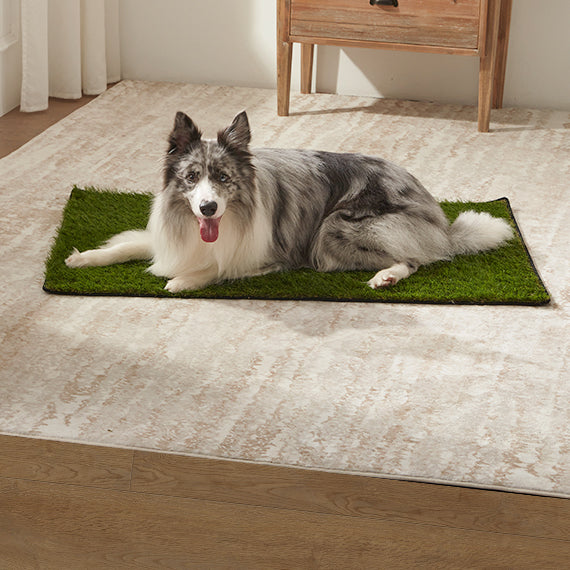All-Season Cat Care Guide
Just like humans, cats have different needs for each season. Whether it’s the sweltering heat of summer or the chilly days of winter, our feline friends need special attention. Here's a playful guide to keep your cat purring all year long.
Summer Cat Care - Keep It Cool
Cool Spots:
Make sure your cat has a cool retreat! Bathrooms are usually cooler, and cats love lounging in bathtubs or shady spots. Crank up the AC, especially for senior cats—they feel the heat more intensely!
Ice Cube Water Bowl:
Toss an ice cube into your cat’s water bowl to keep it refreshingly cool. Senior cats and kittens are extra sensitive to heat, so keep a close eye on them!
Ice Pack Cat Bed:
Slip an ice pack under your cat’s bed or freeze a water bottle overnight and use it as a cooler. Your kitty will love the chill spot!
Breezy Litter Box:
Upgrade to the MEEXPAWS U-Shaped Splash Guard Stainless Steel Cat Litter Box Kit. It’s stylish and keeps your cat’s bathroom experience cool with great ventilation. Regular cleaning keeps it fresh and healthy!

Wet Towel:
Dampen a towel with cool water and gently wipe your cat’s fur. It’s a simple way to help them beat the heat.
Fan:
Set up a fan near your cat’s resting area. Let the gentle breeze keep them comfortable.
Chilled Toys:
Offer some toys you can freeze. They’re fun and refreshing for playtime!
Frequently check your cat’s water bowl to ensure they have plenty of cool, fresh water.
Spotting Heat Stroke
Symptom Check:If your cat is panting, breathing rapidly, dizzy, drooling, restless or lethargic, sweating from their paws, showing bright red tongue and gums, pale gums, collapsing, vomiting, or having seizures, these are signs of heat stroke! Rush to the vet immediately.
Safety Tips
Indoor Playtime:
During the hottest parts of the day, keep your cat indoors. Even shaded areas can become dangerously hot. Remember, the sun moves, and so does the shade!
Car Safety:
Never leave your cat in a parked car. Temperatures inside can soar quickly, leading to heat stroke. Always take your cat with you.
Spring Cat Care - Allergy Management
Clean Environment:Regularly clean your home to reduce pollen and dust mites. Give your cat an allergy-free zone!
Medication Adjustment:
Consult your vet to adjust your cat’s allergy meds as needed. Help them sail smoothly through allergy season.
Health Checks
Annual Check-Up:Spring is the perfect time for a thorough vet check-up. Ensure your cat’s overall health is in top shape.
Vaccinations:
Keep your cat’s vaccinations up to date to prevent diseases. Keep those nasty bugs at bay!
Outdoor Fun:
Safe Outings:
Equip your cat with a flea collar and use flea and tick prevention meds. Let them explore safely!
Avoid Toxic Plants:
Steer clear of plants like lilies and azaleas. Curiosity didn’t just kill the cat—it could poison them too!
Fall Cat Care - Allergy Management
Keep Cleaning:Autumn brings pollen and mold, so keep cleaning to give your cat an allergy-free haven!
Medication Tweaks:
Modify your cat’s allergy meds as advised by your vet. Keep them comfy and allergy-free.
Winter Prep
Check Warmth Supplies:Before winter sets in, ensure your cat’s bedding and clothing are ready. Prepare a cozy nest to keep them warm all winter long.
Diet Boost:
Increase your cat’s protein and calorie intake to help them store energy for winter. High-energy cat food will do the trick!
Outdoor Tips
Leaf Piles:Avoid letting your cat play in leaf piles—they may hide sharp objects or parasites. Keep playtime safe!
Beware of Toxic Plants:
Some fall plants and berries, like mistletoe and holly, are toxic to cats. Keep an eye out!
General Care Tips
Seasonal Awareness:Monitor how seasonal changes affect your cat’s behavior and health. Adjust your care routine accordingly. Be a mindful pet parent!
Fresh Water Supply:
Ensure your cat always has access to fresh, clean water. Hydration is key!
Balanced Diet:
Adjust your cat’s diet based on the season and activity level. Ensure they get balanced nutrition for optimal health.
Winter Cat Care - Keep It Warm
Indoor Warmth:Give your cat a cozy spot during the cold months. Use warm bedding and thick blankets, especially for short-haired and older cats—they need extra warmth!
Outdoor Protection:
If your cat enjoys outdoor adventures, provide a sturdy shelter and access to non-frozen water. A hot water bottle wrapped in a towel can be a great warmer!
Health Monitoring
Weight Watch:
With reduced activity in winter, your kitty might gain weight. Keep an eye on their diet to maintain a healthy weight.
Joint Care:
Cold weather can make joints stiff, especially in older cats. Provide joint supplements to keep them nimble.
Safety Precautions
Avoid Harmful Substances:
Keep your cat away from antifreeze and chemical de-icers—they’re highly toxic!
Home Heat Sources:
Ensure your cat stays away from fireplaces, heaters, and candles to avoid burns and fire hazards. Safety first!
With these tips, you and your cat can enjoy every season to the fullest! Keep your feline friend happy and healthy all year round!
